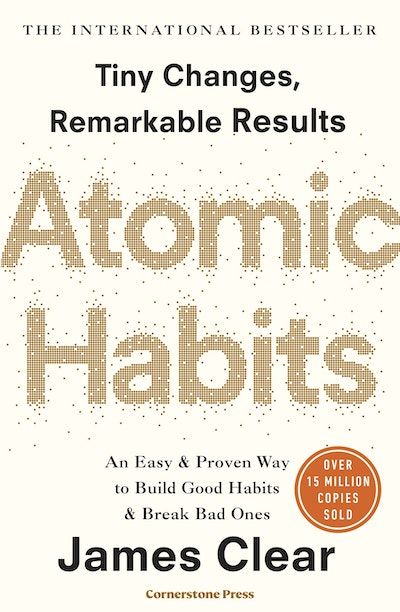Does changing a habit seem like a daunting task? Atomic Habits author James Clear has four simple steps for making it stick.
Changing a habit can be daunting. It can feel like there is such a long road ahead and you don’t know where to start. Maybe you’re one of those people who go hard in the beginning only to burn out later and revert to your old ways.
If this sounds like you, or you want to ease into making changes, Atomic Habits will get you started with such small steps you likely won’t even notice how instantly you’re starting to improve your life.
So what’s the secret? Author James Clear shares four simple steps to building better habits below.
The process of building a habit can be divided into four simple steps: cue, craving, response, and reward. Breaking it down into these fundamental parts can help us understand what a habit is, how it works, and how to improve it.
This four-step pattern is the backbone of every habit, and your brain runs through these steps in the same order each time.
First, there is the cue. The cue triggers your brain to initiate a behaviour. It is a bit of information that predicts a reward. Our prehistoric ancestors were paying attention to cues that signalled the location of primary rewards like food, water, and sex. Today, we spend most of our time learning cues that predict secondary rewards like money and fame, power and status, praise and approval, love and friendship, or a sense of personal satisfaction. (Of course, these pursuits also indirectly improve our odds of survival and reproduction, which is the deeper motive behind everything we do.)
Your mind is continuously analysing your internal and external environment for hints of where rewards are located. Because the cue is the first indication that we’re close to a reward, it naturally leads to a craving.
Cravings are the second step, and they are the motivational force behind every habit. Without some level of motivation or desire – without craving a change – we have no reason to act. What you crave is not the habit itself but the change in state it delivers. You do not crave smoking a cigarette, you crave the feeling of relief it provides. You are not motivated by brushing your teeth but rather by the feeling of a clean mouth. You do not want to turn on the television, you want to be entertained.
Every craving is linked to a desire to change your internal state. This is an important point that we will discuss in detail later. Cravings differ from person to person. In theory, any piece of information could trigger a craving, but in practice, people are not motivated by the same cues.
For a gambler, the sound of slot machines can be a potent trigger that sparks an intense wave of desire. For someone who rarely gambles, the jingles and chimes of the casino are just background noise. Cues are meaningless until they are interpreted. The thoughts, feelings, and emotions of the observer are what transform a cue into a craving.
The third step is the response. The response is the actual habit you perform, which can take the form of a thought or an action. Whether a response occurs depends on how motivated you are and how much friction is associated with the behaviour. If a particular action requires more physical or mental effort than you are willing to expend, then you won’t do it. Your response also depends on your ability. It sounds simple, but a habit can occur only if you are capable of doing it. If you want to dunk a basketball but can’t jump high enough to reach the hoop, well, you’re out of luck.
Finally, the response delivers a reward. Rewards are the end goal of every habit. The cue is about noticing the reward. The craving is about wanting the reward. The response is about obtaining the reward. We chase rewards because they serve two purposes: (1) they satisfy us and (2) they teach us.
The first purpose of rewards is to satisfy your craving. Yes, rewards provide benefits on their own. Food and water deliver the energy you need to survive. Getting a promotion brings more money and respect. Getting in shape improves your health and your dating prospects. But the more immediate benefit is that rewards satisfy your craving to eat or to gain status or to win approval. At least for a moment, rewards deliver contentment and relief from craving.
Second, rewards teach us which actions are worth remembering in the future. Your brain is a reward detector. As you go about your life, your sensory nervous system is continuously monitoring which actions satisfy your desires and deliver pleasure. Feelings of pleasure and disappointment are part of the feedback mechanism that helps your brain distinguish useful actions from useless ones. Rewards close the feedback loop and complete the habit cycle.
If a behaviour is insufficient in any of the four stages, it will not become a habit. Eliminate the cue and your habit will never start. Reduce the craving and you won’t experience enough motivation to act. Make the behaviour difficult and you won’t be able to do it. And if the reward fails to satisfy your desire, then you’ll have no reason to do it again in the future.
Without the first three steps, a behaviour will not occur. Without all four, a behaviour will not be repeated.













